lecture 4 古希腊罗马神话 英文版 教学课件
希腊神话 罗马神话PPT
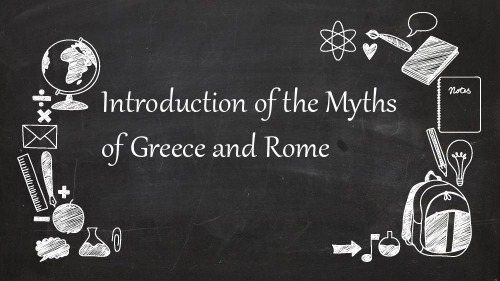
Greek myths Roman myths Interrelationships Mythological stories
01
Greek myths
Greek Mythology is a group of traditional tales told by the ancient Greeks about the deeds of gods, heroes and their relations with human beings. The Greek mythology is an important part of the ancient culture which has vast and deep influence on the whole western culture. Its great influence upon the English language and literature is beyond description. A great number of words and idioms in the English language come from the Greek mythology.
Apollo
The sun-god Apollo
Among the crowd of Olympian gods the one most widely admired was Apollo.He was the son of Zeus and Let to.According to Greek mythology, Leto was driven by Hera from land to land at last Poseidon took Pity on her and brought the island of Delos out of water for her to live on.There she gave birth to the twins ,Apollo and Artemis. Apollo was me sun-god.He wore a purple robe.He usually sat in his bright eastern palace early in the morning and madeready to start his daily journey across the sky.During the day hed rove his carriage of gold and ivory , and brought light, life and love to the great world below. Iate in the afternoon he came to the end of his journey in the far western sea and got on his golden boat to return to his eastern home.
希腊罗马神话英文讲义

1 The Beginning of the worldBefore earth and sea and heavens became known the face of nature was one crude, formless mass. Land and sea and air were mingled together. The universe was a uniform darkness, without sun and moon, and the earth was no more than an embryo heap. In the middle of the pervading gloom sat Chaos and his wife, the goddess of Night (Nyx), who reigned but did not rule, for the whole space was lifeless. Centuries later, with the birth of Light and Day, earth and sea and air came into existence. Still later, the union of Gaea (Earth) and Uranus (Heaven) gave birth to the Titans, the Cyclopes and the Centimani, all giants in stature and strength. Afraid that his own gigantic children might usurp his throne, Uranus drove them all back to the earth, and thus roused the resentment of the mother Gaea. At her instigation one of her sons, Kronus (Saturn), attacked and wounded Uranus with a sickle he had taken from his mother, and took over as supreme ruler of the universe. He married his own sister Rhea and entrusted the management of the sun to his brother Hyperion and the moon to his sister Phoebe. He ruled his realm peacefully until an oracle prophesied that he would one day be dethroned by one of his own children. To avert the disaster he took the excessive precaution of swallowing up all his five children one by one immediately after their birth. These were Hestia (Vesta), Demeter (Ceres), Hera (Juno), Poseidon (Neptune) and Hades (Pluto). When Rhea bore the last child, Zeus (Jupiter) by name, Kronus wanted to get rid of him in the same fashion. But the mother wrapped up a piece of stone in the infant’s swathes and handed it over to the unsuspecting father. Thus Zeus was saved, and sent to Mt Ida, where the mountain nymphs did all their power to protect him from any harm. By the time Kronus became aware of the deception it was too late, for young Zeus suddenly appeared before him and easily deposed him. With the help of a nauseous potion, Zeus forced his father to disgorge his five brothers and sisters. But Kronus and his Titans were not reconciled to their defeat. They made war on Zeus and his brothers and sisters. Acting on the advice of his mother Rhea, Zeus released the Cyclopes from under the earth and armed himself of their thunderbolts, for the Cyclopes were thunderbolt-makers. The rebellious Titans were soon reduced to submission and cast down into Tartarus. Zeus became the undisputed ruler on Olympus. He made his sister Hera his queen, and distributed power among his brothers and sisters and his sons and daughters. Among others, Poseidon ruled over the vast expanse of seas and oceans, and Pluto was created lord of the lower world. Thus, for untold centuries, the Olympians reigned supreme in the universe, lording it over man and beast alike, until they were dethroned and superseded by a new, monotheistic faith.2 The Olympian GodsBetween Macedon and Thessaly of northern Greece there stood a lofty mountain range whose cloudy summit rushed into the very heavens. On the culminating point of the range, Mt Olympus, was bathed in bliss and brightness the home of the gods,where Zeus ruled as the father of gods and men. Zeus was not an autocrat by any standards. All the gods submitted to his final word, it was true, but Zeus made them all sit on a committee, a council of twelve members, embracing six gods and six goddesses. First in the Olympian crowd sat Zeus himself, the overlord of gods and men and the wielder of the thunderbolt. Next to him was Hera, his proud and jealous queen. Poseidon, as has been told earlier, was ruler of the sea, and Hades, king of the lower world, had no seat in the council chamber. Apollo was the god of the sun, music, poetry and prophecy, while his twin sister Artemis (Diana) was the goddess of the moon and the chase. Athena (Minerva), the goddess of wisdom and patroness of domestic arts, personified pure intellect; Hestia, the goddess of the hearth, represented home life and family happiness. The blustering Ares (Mars) was the god of war, and the charming Aphrodite (Venus) the goddess of love and beauty. The lame god of fire, Hephaestus (Vulcan), was the forger of the thunder-bolts of Zeus and the fashioner of arms and all sorts of metal work for the gods and heroes. The wing-footed messenger Hermes (Mercury) was the god of invention and commerce and patron of thieves. And the goddess of grains and harvests, Demeter, supervised agriculture and stood for mother of civilization.All the major gods mentioned above assumed human forms of peerless beauty and grace. Often moved by human feelings and desires, they frequently gave way to fits of anger and jealousy and became involved in the ceaseless brawls of the world of man. Among themselves at Olympus they intrigued and scrambled for supremacy; down in the world of mortals they experienced rivalries and frustrations, and enjoyed earthly friendships and loves. A crowed of immortal celestials who looked and behaved in a perfectly human fashion-- that is what the pantheon at Olympus actually was.3 PrometheusPrometheus (forethought) was a Titan. In the war between Zeus and the giants he had stood on the side of the new Olympian gods. Out of clay he fashioned the first man, to whom. Athena gave soul and holy breath. Prometheus bestowed on his creation the gift of fire, which raised man above all animals. Later, at a joint meeting of gods and men held to decide what part of burnt offerings should be allotted to the gods and what to men, Prometheus cut up an ox and divided it into two portions: under the skin he placed the flesh, and under the fat he put the bones, for he new the greedy Zeus loved fat, Zeus saw through the trick and felt displeased at the Titan’s favor towards men. So in a masterful fashion he deprived mankind of the gift of fire. However, Prometheus managed to steal fire from heaven and secretly brought it down to men. Flying into a rage at this wanton act of defiance, Zeus had him chained to a rock on Mount Caucasus, where a ravenous vulture ever tore at his liver which ever grew again. His period of ordeal was to be thirty thousand years. Prometheus faced his bitter fate firmly and never quailed before all the fiery majesty of Zeus. The two were at last reconciled by Heracles (Hercules), who, coming over in quest of the golden apples (see p.164), slew the eagle and set the benefactor of mankind free.4 PandoraAfter the theft of fire Zeus became increasingly hostile to men. One day he commanded his son Hephaestus to mold an image of a beautiful maiden out of clay and asked the gods and goddesses to endow her with different kinds of gifts. Among others, Athena clothed her in a gorgeous robe and Hermes gave her the power of telling lies. A charming young lady, she was the first woman that ever lived. Zeus called her Pandora, for she had received from each of the gods and goddesses a gift which was harmful to men.Zeus decided to send her down to men as a present. So Hermes the messenger brought her to Epimetheus (afterthought), brother of Prometheus. The greatness of her beauty enslaved the hearts of all who looked upon her, and Epimetheus joyfully received her into his house. He had quiet forgotten Prometheus’warning never to accept anything from Zeus. The pair lived a happy life for some time. Then misfortune befell the human world.When he was preoccupied with teaching men the art of living, Prometheus had left a big cask in the care of Epimetheus. He had warned his brother not to open the lid. Pandora was a curious woman, and had been feeling bitterly frustrated that her husband had repeatedly forbidden het to take a look at the contents of the cask. One day, when Epimetheus was out, she lifted the lid and out from it came strife and war, plague and all the sickness, theft and violence, grief and sorrow, and all the other evils that the human world was henceforward to experience. Only hope stayed within the mouth of the jar and never flew out. So men always have hope within their bosoms.5 The Four AgesThere had been four ages since the human world first came into existence, the Golden Age, the Silver Age, the Age of Bronze and the Age of Iron.The Golden Age was the best of all. It was an age when Kronus sat on the throne. Bounteous nature satisfied all the wants of men. There were no extremes of cold and heat. And the evils of the human world were still kept in the cask which Epimetheus guarded and Pandora was not yet made to open. Men lived a blissful life, for ever young, always feasting and revelling, and knowing neither toil nor sorrow. When death came it came like a peaceful sleep, and they became good spirits watching over mortal men.The Silver Age was one in which the human race was somewhat inferior in body and mind. The period of helpless infancy lasted a hundred years, and the time of manhood, short and troubled, men spent in ignorance and evil. They no longer worshipped the gods and offered no sacrifices. However, as the race of the Silver Age was not entirely devoid of virtue, they had some honor and lived on as spirits under the earth. During the Age of Bronze men further degenerated. Clad in bronze and armed with weapons of bronze, they lived in houses of bronze. Ruthless and ferocious, theydelighted in war and perished in ceaseless internecine strife. When they died they descended into the darkness of the lower world.The last age, that of Iron, was one of endless care and grief. There was no family love, no sense of filial duty, and no friendship and hospitality. Nor was there any faith, truth and justice. Evil was rampant, might was right, and the flames of war scorched the earth. It was a race of men deserted by gods.6 The FloodTowards the end of the Age of Bronze the human world became very wicked. Men grew greedy, insolent and impious. Neither right nor law respected any longer, and the rule of hospitality was forgotten. Disguised in human form, Zeus visited Arcadia and Thessaly, and was disguised with the deadly sins of men. He decided to clear the earth of them all. Without hesitation he released the rainy south wind and called upon the merciless Poseidon to help. Soon the whole world was submerged in a boundless ocean, and the entire human race perished in the unprecedented flood, all but two humble Thessalians.These were an old childless couple, kind and pious and contented with life. The man was called Deucalion and his wife Pyrrha. Son of Prometheus, Deucalion had been forewarned by his father of the forthcoming flood and had made himself a huge chest. When the roaring deluge came the couple took refuge in it and floated for nine days until it touched land again on Mt Parnassus.The once bustling world presented an unnerving sight. It was now all death and devastation. Feeling lonely and insecure, the old couple prayed to the gods for help. An oracle instructed them to cast the bones of their mother about. The son of the wise Titan, having divined the true meaning of the mysterious command, started throwing stones behind him. A miracle occurred. The stones that the man cast became men; those that the woman threw were turned into women. To Deucalion a son was born later, Hellene by name, who had three sons, Aeolus, Dorus and Xuthus. Aeolus and Dorus became the ancestors respectively of the Aeolians and Dorians. Xuthus had two sons, Ion and Achaeus: the former the progenitor of the Ionians, and the latter of the Achaeans. The land was repeopled, and the Heroic Age had begun.7 Zeus and HeraAfter he had deposed his father, Zeus looked about for a spouse. And one of his sisters, the beautiful and majestic Hera, won his heart. He wooed the lady and was only too readily accepted. At the marriage feast, to which all the residents of Olympus were invited, Hera was declared queen of Heaven and goddess of marriage. They were perfectly happy for a time, but not for long. For Zeus was somewhat lecherous while Hera was intolerably jealous. Despite the fact that Zeus was all-ruling and all powerful, he frequently found it necessary to be on the look-out for his queen. Whenever he slipped down Olympus to seek new love, he saw to it that someclouds were spread to throw his wife off the scent. Hera, for her part, while ultimately submitting to the will of Zeus, kept the father of gods and men under close and constant observation, and was never accommodating enough to reconcile herself with her husband’s new attachments. She had been for ever on the run, trying to keep track of Zeus and devise ways of revenge not always on the all-conquering god, but rather on his hopeless mistresses. Zeus was always able to get away, but the ladies were often left behind to the tender mercies of the queen. Zeus’ zest for life knew no limits, while Hera’s persecution of her rivals and their children were relentless and not at all always justifiable. She viciously transformed comely Callisto into an ungainly bear; she maliciously kept Io wandering in the form of a heifer, giving her no peace; and she spared no effort to molest Heracles until the hero was tormented to a miserable death. Not infrequently did she inflame the rage of Zeus so that the father of gods and men punished her severely. On one occasion Zeus hung her in the clouds, tying two heavy anvils to her dangling feet. But apart from these petty squabbles and miner imperfections of character, they were quite a happy, almighty couple, revered as king and queen of heaven, he, a sky-god, bringer of light, arbiter of right and wrong and giver of reward and punishment, and she, a special guardian of women and a goddess who presided over childbirth.Zeus and Hera had three children, Ares, Hephaestus and Hebe. Ares (Mars) was the hateful god of war and Hephaestus the physically handicapped god of forge. But Hebe was for ever young, rosy and blooming, representing youth and happiness. At the celestial table on Olympus she had served to bear cups of wine to the gods and was ever at the wish of Zeus to pour out nectar. On one solemn occasion, however, the goodness tripped over something and fell, and was thus forced to resign her office. She was endowed with the power of restoring youth and vigor to gods and men. When Heracles had lived out his earthly life span and his soul had come up to Olympus to take his rightful seat there, she married the hero and lived a blissful life .8 IoIo was the daughter of a river-god. She was loved, wooed and won by Zeus. Hera became so jealous that she flew down from Olympus one day to wreak vengeance on her rival. Zeus, however, had foreseen her arrival and changed Io into a beautiful white heifer. Seeing the deceit, Hera requested the heifer as a present and Zeus had to yield to her wish. Then she entrusted the heifer to the care of a hundred-eyed monster, Argus, from whose ever-wakeful eyes no escape was possible. Unable to endure to see her so unhappy, Zeus sent Hermes down to destroy the monster. Disguised as a shepherd, Hermes lulled Argus to sleep with his dulcet songs and tedious stories, then slew him and set Io free. But Hera’s jealous wrath was not to be appeased yet. She sent a gadfly to harry the heifer and drive her from land to land. In her agony the heifer passed over the strait which divides Europe and Asia. Whence the stripe of water got its name Bosporus, the way of the cow. She wandered over the sea, which incidentally derived from her its name the Ionian Sea. Eventually she arrived in Egypt where she was restored to her natural form. She settled downand gave birth to a son. Some of her descendants remained in Egypt and ruled as kings for a long time.9 CallistoIn the charming retinue of Artemis (Diana) there was a beautiful nymph called Callisto. Zeus loved her passionately and often sought her company. Before the year was out she bore him a son, Arcas by name, who later became the eponymous ancestor of the Archadians. Zeus’frequent absences from Mt Olmpus aroused Hera’s suspicions. In time the vengeful queen discovered the truth and devised an effectual scheme of retaliation. One day Callisto suddenly found herself changed into a bear, with monstrous bushy jaws and blood-shot eyes, though she remained human in heart. She instantly left her son and went into hiding in the forest.Years passed. Little Arcas had matured to youthful manhood. He was hunting merrily in the woods one day when a huge gray bear suddenly appeared before him. Both were amazed, he terrified at the sight of the grisly bear, and the bear having recognized her own son in the young hunter. The young man leveled his spear at the slowly approaching bear and was about to pounce upon it when Zeus intervened to stop the folly. For he had not been able to find the whereabouts of his beloved mistress until quite recently and he had been secretly shielding her from all danger and harm. Now he transformed his son into a little bear, and sent both mother and son into the high heavens, where they have remained to this day, known as the constellation of the Great and Little Bear.10 AthenaOn one occasion Zeus suffered a racking headache. When all the gods, including Apollo, the god of medicine, had tried in vain to offer an efficacious remedy, the father of gods and men summoned Hephaestus to split open his head. This the god of fire did, and to the wonder of all the Olympians, a goddess, full-grown and full-armed, issued from the cleavage, radiating light and splendor. She was Athena, goddess of wisdom and knowledge and patroness of Athens.The story of Athena becoming patron goddess of Athens concerns the rivalry between the goddess and Poseidon. When the city of Athens was first built by a Phoenician, both Poseidon and Athena vied for the honor of naming it. It was then agreed that whoever offered the most useful object for men would became the patron of the city. Poseidon struck the ground with his trident and produced a horse, whereas Athena had an olive tree to present, an emblem of peace and plenty. As the horse was deemed as signifying strife and sorrow. Athens was named after the goddess, who forthwith took the city under her protection.Athena was the goddess of arts and crafts and woman’s handiwork. She was so deft with her hands the she tolerated no challenge to her skill in this respect. A Lydian maid, Arachne by name, did not seem to think much of A thena’s dexterity, for she frequently boasted that she could beat the goddess if she had the opportunity to doso. The goddess was quite irritated. Disguised as an old woman, she went to advise Arachne to be modest. But the ignorant craftswoman wantonly dared the goddess herself to come down and compete with her. At this blatant piece of defiance the goddess cast down her disguise and accepted the challenge. The two contestants immediately set about embroidering different designs. While the goddess worked on the story of her rivalry with Poseidon, Arachne began to weave a delicate web. When both pieces were finished, Arachne saw, to her surprise, that she had been beaten, for the goddess’ design was infinitely superior. She felt so chagrined that she tied a piece of silk to hang herself. But just before she breathed her last the goddess changed her into a spider, condemning her to weave for ever.Though often represented as fully armed, helmet and breastplate and all that, she favored patriotic defence. Almost the only goddess who was virgin and free of scandal, Athena seldom exhibited the weaknesses of the gentler sex. She cut a pretty martial figure in the world of myth, and enjoyed worship among the ancients.11 ApolloAmong the crowed of Olympian gods the one most widely worshipped was Apollo, son of Zeus and Leto (Latona). According to Greek mythology, Leto was driven by Hera from land to land until at last Poseidon took pity on her and brought the island of Delos out of water for her to live on. There she gave birth to the twins, Apollo and Artemis.Apollo was the sun-god. Dressed in a purple robe, he sat in his bright eastern palace at dawn and made ready to start his daily journey across the sky. During the day he rode in his chariot of gold and ivory, and brought light, life and love to the vast world below. At dusk he came to the end of his journey in the far western sea and got on his golden boat to return to his eastern abode.Apollo was the god of music and poetry. He was the inspirer of all emotions which find expression in lofty song. With his lyre of gold and the harmonious accents of his god-like voice he led the choir of the muses at Olympus . The dulcet music from his lyre was so inspiring that stones marched into their places in rhythmic time and of their own volition when he help Poseidon build up the walls of Troy . On one occasion, challenged to a contest by the mortal musician Marsyas, he first excelled him and then flayed him to death for his presumption. On another he lost out to Pan at a musical contest and transformed the ears of the judge, King Midas, into those of an ass.His son, Orpheus, inherited such skill from the father that his harp moved man and beast alike .Apollo was the god of prophecy. As revealer he made known the hidden things of Zeus. Men turned to him for advice and guidance in cases of perplexity. Though seldom in direct intercourse with mortals, he granted a special communication of counsel through oracles. His oracle at Delphi was the most renowned because the most stoutly believed of all.Apollo represented youthful, manly beauty. His golden hair, stately bearing andradiant air all combined to make him the admiration of the world. A fair maiden, by the name of Clytie, was so enamoured of his beauty and glory that from dawn to dusk she knelt on the ground, her hands outstretched towards the sun-god, and her eyes gazing at his golden-wheeled carriage racing across the azure sky. Though her love was not requited she had never changed her mind about Apollo. The gods were moved at the pathetic sight, and metamorphosed her into a sunflower.Apollo was also the god of health and healing. His son, Aesculapius, possessed such magic power to call back the dead to life that Zeus felt it advisable to get rid of the mortal physician with his thunderbolt and thus put an end to such interference with his divine authority. Apollo was not happy about this at all. As the Cyclopes had helped make the thunderbolts for Zeus, Apollo would have certainly slain the meddlesome giants had the father of gods and men not intervened himself. Apollo was banished from Olympus to serve a mortal on earth for a year . Because of his more intimate intercourse with the human world he knew more about the bitter life of the mortals, and he was obviously more sympathetic towards them. He slew Python, the monster, which made havoc on a vast area around, and was incidentally known at times by the alias Pythia. “The fire-robed god” thus was a blessing to the world of man.12 DaphneDaphne was a lovely blooming nymph. As she was frolicking in the woods one day she saw Apollo the sun-god gazing at her with more than amazement and admiration in his eye. The beaming face of the sun put her to flight. The eager Apollo followed her closely behind, calling out to her to stop. His passion having been kindled by her beauty and grace, he was afraid that this might be the last time he saw her. The nimble nymph made the best of her legs, but the ardent Apollo pressed hard upon her. Through rough fields and pathless woods she ran, but the sound of his pursuing feet ever grow nearer. As he ran he entreated his beloved to slow down, for he feared that she might tumble over and bruise her sparkling skin on the rugged roads. But the fugitive nymph never cared so much as to throw one glance backwards. At last she was quite breathless and cried to her father, a river-god, for help. No sooner had prayer been uttered than answered, for she had instantly found herself glued to the ground and a layer of soft bark growing over her fair skin. She had been turned into a laurel tree. Sighing, Apollo embraced the tree trunk, which responded by shrinking back. To show his undying love for the nymph, he decided that the laurel would be his favourite tree and should be the prize of honour and renown for deathless poets and poetry. Thus the most accomplished poet always desires to be made a poet laureate.13 NiobeNiobe, the queen of Thebes, had indeed good reason to be proud of herself. On both sides of her family, she was descended from the gods. Her husband was a gifted andaccomplished musician. And she was both wealthy and powerful. But what made her the happiest lady in the world was her fourteen children, seven manly sons and seven beautiful daughters. They were all so strong and fair that the whole world looked upon them with admiration.It happened at the time that every spring the Theban women gathered at the temple of Leto to offer laurels at the altars of the great mother who had given birth to two grand children, Apollo and Artemis. The piety and reverence shown by her women made Niobe jealous and wrathful. When the priestess of Leto called the women again to the shrine of the mistress of Zeus one spring, Niobe decided to put an end to the folly once and for all. In her pretty flowing robe she came to the gathering and reproached the crowd for their fanatical faith in a goddess whom they had never seen. She declared herself nobler and greater, and demanded to be worshipped in place of Leto, who, she said, was no more than a humble mother of two children. The frightened women yielded their allegiance to the queen, and left the shrine in silence. Leto was neglected.Standing on top of a hill overlooking Thebes, Leto saw all this and was bent on her vengeance. She sought out Apollo and Artemis and told them the story. Before long, the impatient avengers arrived outside Thebes in hidden clouds. The seven sons of Niobe were frolicking on the playground, two practising horsemanship and two wrestling while the other princes happily stood by. Apollo held out his bow. One by one the princes fell under his unfailing shafts. Even the youngest, who prayed for mercy, was not spared.Niobe was utterly changed. She was all sorrow and grief, but her insolent spirit was not subdued. She came to the dead bodies of her sons with her daughters and let out a torrent of irreverent language at Leto and her children. This time it was Artemis’turn to draw her bowstring. Almost in a twinkling of an eye all the seven vivacious daughters fell, weltering in their blood, and soon ceased to breathe. Niobe became numb of feeling. She sat amidst the fourteen dead bodies, motionless, her eyes blank, her tears coursing down her cold cheeks. Her excruciating anguish had turned her into a stone! Later, a gust of wind swept her to her homeland in Asia, where she could still be seen sitting on top of a hill, tears of bitterness streaming out of her strong sockets.14 ArtemisJust as Apollo drove his golden chariot across the heavens during the day, worshipped as the sun-god, so Artemis raced across the sky in solemn pomp at night, revered as the moon-goddess. Sitting in an airy chariot drawn by milk-white steeds, “the queen of wide air” shed silver light all over the sleeping world below. Though she remained single all her life the maiden heart of the goddess was at least for once thrilled as she saw the beautiful youth Endymion sleeping. She might have felt tenderness towards Orion, but she had probably regarded him more as a hunting companion. She was chaste and fair and serene. She was the paragon of maiden modesty andgrace. Just as Apollo represents manly beauty, so Artemis stands for feminine chastity and virginity. As their patron goddess she took it upon herself to protect marrying girls and young women in trouble. It was to her altar that those maidens turned for love and happiness.The twin sister of Apollo was also the goddess of hunting and wild life. Dressed in a short hunting-suit coming up to the knee and followed by a team of boisterous lovely nymphs, Artemis had always her bow of pearl and crystal-shining quiver with her and roamed the forest in pursuit of game. When she felt hot and tired she would retire to a spring to bathe. It was here that young Actaeon inadvertently came and suffered cruel treatment at the hands of the goddess. Indeed, the goddess could be thoroughly ruthless and ceased to be lovely the moment the wicked side of her nature got the upper hand in her. The tragedy of Niobe was just a case in point.15 ActaeonWhen she was tired with hunting Artemis used to bathe in a little mountain spring.One hot summer afternoon she was refreshing herself in the cool,quiet brook with her nymphs when she heard a rustle behind the bushes .She felt quite annoyed to find that a young hunter was peeping admiringly at her naked form.Her nymphs gave a shrill cry and crowded around the goddess.But young Actaeon had seen the huntress.Actaeon loved the chase.He had been scouring the woods every day.On this particular afternoon he felt so tired with running about that he unwittingly came over to the spring in search of water,and thus surprised t Artemis bathing.The irritated goddess was not to be appeased.She splashed water in the hunter's face,and no sooner had the water drops fallen on Actaeon than he was transformed into a stag .Just at this moment he heard the howling of his pack of fifty hounds coming up to him.He was suddenly seized with fear ,and presently fled.The dogs,all driven mad by the goddess,pursued him closely behind.Running as fast as his legs could carry him,Actaeon was soon out of breath .Feeling certain that he was doomed,he dropped to the ground and made no further attempt to stir.The dogs closed in on their former master and tore him to pieces.16 OrionOrion was a giant hunter.He was the beautiful son of Poseidon.One day,when hunting in the forest,he caught sight of Artemis' nymphs,the seven Pleiades.He was so fascinated with their beauty that he started chasing them.In despair the charming maidens prayed to Artemis for help and were sent up by the goddess to the heavens as a constellation. Later he fell in love with another maiden,Merope by name,but impetuous and impatient,he ravished the maiden and enraged her father,King Oenopion of Chios.The king made him drunk and put out his eyes .Following the sound of the Cyclopes' hammer,he went to Hephaestus,who sent a guide to travel。
古希腊神话故事英语简介PPT课件
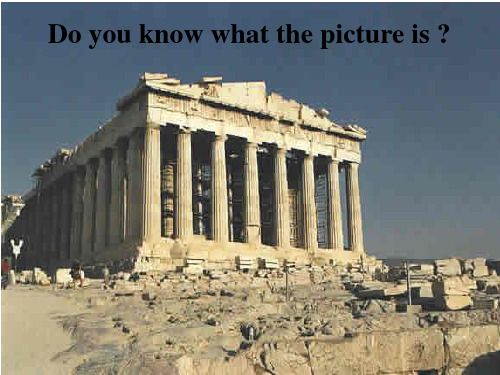
One day, Apollo laughed at the archery(箭术) of Cupid, which let Cupid very angry. Then Cupid shot two special arrows, the first gold arrow, will make people fall deeply in love. Second lead arrow, it will make people refuse to love. The first arrow hit Apollo, and second arrow hit a beautiful girl named Daphne, who was the daughter of river god.
18
Because of the apple, Venus, Hera, Athena quarreled madly. They asked Zeus to judge who is the most beautiful goddess. Zeus made Apollo judge. Apollo put this task to the mortal(凡人) Paris.
Both heroes and fairy people, men and gods in Greek mythology seems too unbearable(不堪). In Greek mythology, almost impossible to find tall big and up(高大上)type who meet the eye everywhere in Chinese mythology characters.
13
Apollo madly in love with Daphne, but the girl admire the moon goddess, willing to follow her into an eternal virgin(永恒的处女). One day, Apollo met Daphne in the woods , he wanted to talk to her. But because of the arrow of Cupid, she kept away from him...... Daphne was very panic and shouted loudly to God for help. God became her into a laurel tree(月桂树).
古希腊神话英文介绍ppt课件

Most stories concerning Hera have to do with her jealous revenge for Zeus‘s infidelities(不忠).
10
Poseidon 波塞冬
Brother of Zeus .
God of the sea , Protector of all waters.
3
PART1:The Olympian Gods and other Deities
1、the Gods 2、other Deities
4
The ancient Greeks worshiped many gods. Greek gods can be divided into several groups.The earliest group was Titans , led by Cronus . The most powerful group was the Olympians . The Olympians are a group of 12 gods who ruled after the overthrow of the Titans. All the Olympians are related in some way . They are named after their dwelling(住宅,住所)place Mount Olympus.
The archer, far shooting with a silver bow (弓箭).
24
He wore a purple robe. He usually sat in his bright eastern palace early in the morning and journey across the sky.
希腊神话 英文PPT课件
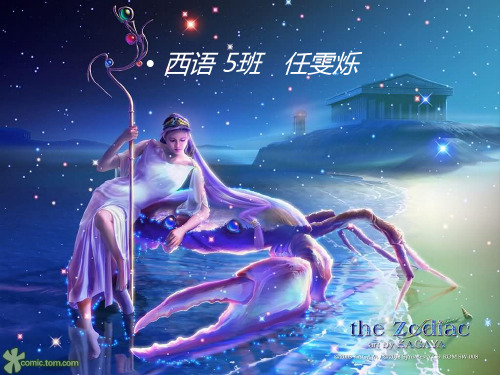
希腊神话是古文化重要的一部分,与整个西方文化有着广泛而又紧密的 联系。
Its great influence upon the English language and literature is beyond description. A great number of words and idioms in the English laguage come from the Greek mythology.
Hephaestus(赫斯菲托斯): the god of fire and the forge(熔炉).
Apollo(阿波罗):
the god of light.
Artemis(阿尔忒弥斯): the goddess of chastity,virginity,the hunt,
the moon,and the natural environment.
• All the chief gods mentioned above took human forms of incomparable beauty and grace, often moved by human feelings and desires, they frequently gave way to anger and jealousy.they became involved in ceaseless battles with the world of man. among themselves at olympus they plotted and struggled for power.in the human world they experienced competitions and difficulties.they enjoyed earthly friendships and loves.acrowd of everlasting gods looked and acted in a perfectly human fashion that is what all gods at olympus actually were.
希腊神话英语演讲PPT
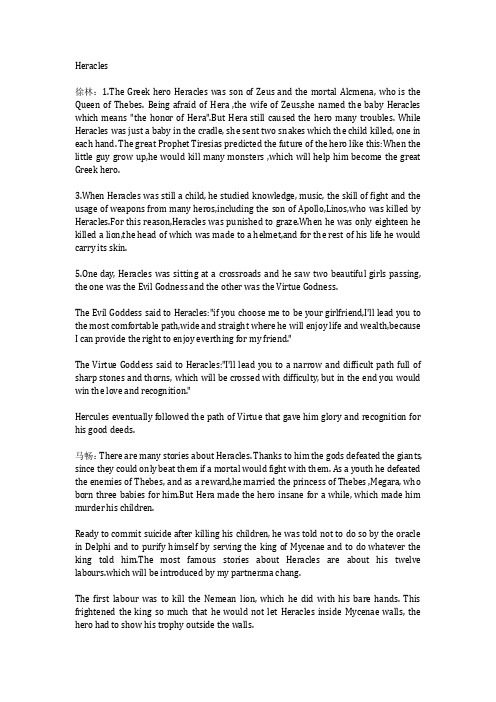
Heracles徐林:1.The Greek hero Heracles was son of Zeus and the mortal Alcmena, who is the Queen of Thebes. Being afraid of Hera ,the wife of Zeus,she named the baby Heracles which means "the honor of Hera".But Hera still caused the hero many troubles. While Heracles was just a baby in the cradle, she sent two snakes which the child killed, one in each hand. The great Prophet Tiresias predicted the future of the hero like this:When the little guy grow up,he would kill many monsters ,which will help him become the great Greek hero.3.When Heracles was still a child, he studied knowledge, music, the skill of fight and the usage of weapons from many heros,including the son of Apollo,Linos,who was killed by Heracles.For this reason,Heracles was punished to graze.When he was only eighteen he killed a lion,the head of which was made to a helmet,and for the rest of his life he would carry its skin.5.One day, Heracles was sitting at a crossroads and he saw two beautiful girls passing, the one was the Evil Godness and the other was the Virtue Godness.The Evil Goddess said to Heracles:"if you choose me to be your girlfriend,I'll lead you to the most comfortable path,wide and straight where he will enjoy life and wealth,because I can provide the right to enjoy everthing for my friend."The Virtue Goddess said to Heracles:"I'll lead you to a narrow and difficult path full of sharp stones and thorns, which will be crossed with difficulty, but in the end you would win the love and recognition."Hercules eventually followed the path of Virtue that gave him glory and recognition for his good deeds.马畅:There are many stories about Heracles. Thanks to him the gods defeated the giants, since they could only beat them if a mortal would fight with them. As a youth he defeated the enemies of Thebes, and as a reward,he married the princess of Thebes ,Megara, who born three babies for him.But Hera made the hero insane for a while, which made him murder his children.Ready to commit suicide after killing his children, he was told not to do so by the oracle in Delphi and to purify himself by serving the king of Mycenae and to do whatever the king told him.The most famous stories about Heracles are about his twelve labours.which will be introduced by my partner.ma chang.The first labour was to kill the Nemean lion, which he did with his bare hands. This frightened the king so much that he would not let Heracles inside Mycenae walls, the hero had to show his trophy outside the walls.The second labour was to fight the Hydra, an immortal monster with nine heads. If a head was cut off, two new would grow out in its place. Heracles defeated the Hydra with the help of his friend Iolaus. Each time a head would be cut off, Iolaus burnt the neck with fire, and so no new heads could grow out. When all the heads were off they buried the monster under a pile of stones. Heracles dipped his arrows in the Hydra's blood, making them lethal.The third labour was the capture of the the deer of Kyrenia, which had feet of brass and horns of gold, he chased it for a whole year and brought it alive to Eurystheus in Mycenae.The fourth labour was the capture of a terrible wild boar which lived on the mountain Erymanthos in North Arcadia.The fifth labour was to clean king Augeias' stable in Elia on the Peloponnese. The stable was huge and full of dung, and Heracles cleaned it by leading two rivers into it.The sixth labour was to kill the monster birds at Stymphalos (Stymphalia) in North Arcadia, which he did with the help of Athena.舒天泽:The seventh labour was to capture the Cretan bull, which either was the father of the Minotaur or the bull that had taken Europa on its back. Heracles brought it to Mycenae, but let it go, and it wandered off to Attica where Theseus later had to fight it.The eight labour was to capture king Diomedes of Trace's man eating horses. Heracles killed the king and captured the horses, and founded the city Abdera.The ninth labour was to get the girdle of the Amazon queen Hippolyte. He either defeated her or she gave it to him willingly.The tenth labour was to bring back the herd of the giant Eurytion on the island Erytheia. On his way to this western place by Oceanos, he made a passage through the Atlas mountains, setting up the pillars of Heracles - today's Gibraltar. He made it to the island in the cup of the sungod, and killed Eurytion and his dog Orthros. The herd he brought with him back to Greece.The eleventh labour was to bring back the golden apples of the Hesperides. According to one version he killed the dragon that guarded the apples and took them. According to another he went to Atlas, the father of the Hesperides. Heracles took the sky on his shoulders while Atlas went to get the apples, but when he returned he did not want to take over the burden of the sky again. Heracles then told him to hold the sky only for a short moment while he put a pillow on his shoulders, and so tricked Atlas into taking his position again.The twelfth, and final, labour was to bring back the three headed dog Cerberus, which guarded Hades, which he did. Cerberus was son of Typhon and Echidna, who had brothers the two headed Orthrus, the dog of Geryon and the Hydra.After these labours Heracles had made his penance, and he married Deianeira, whose father was Poseidon's son Antaeus.When Heracles killed the centaur Nessus for attacking his wife, the dying centaur told Deianeira something that would cause Heracles`s death like that,"You might save some of my blood and dip a tunic in it. if you ever needed to secure Heracles's love,all you had to do was to make him wear the tunic."When Heracles later wore it the centaur's blood turned out to be poison, and he could not get it off, slowly poisoning him to death and causing him great pain.Heracles then climbed the funeral pyre and was deified, marrying Hebe on Mt. Olympus,and he became the Hercules.。
希腊神话_英文PPT讲解
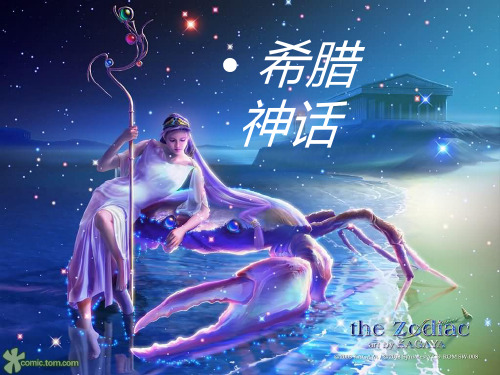
Advised by his mother, Grouns beats Uranus, severs the link between sky and earth, and becomes the new king of the cosmos. Gronus copulates with his sister, Rhea to bring about Zeus and siblings, the future of older Olympians.
Hestia: the goddess of the Hearth of war.
Hermes: the god of thieves and commerce.
Hephaestus:the god of fire and the forge(熔炉).
Apollo: the god of light.
Artemi: the goddess of chastity,virginity,the hunt,
the moon,and the natural environment.
Athena: the Greek virgin goddess of reason, .
Aphrodite : the goddess of love,desire and beauty.
the Gods
Zeus :
the god of the sky.
Hera:
the goddess of marriage and childbirth.
Poseidon: the god of the sea,protector.
Hades: the god the dead andwealth.
• Hera(Juno), A proud and green-eyed woman. Queen of marriage, women, childbirth, heirs, kings and empires. She is daughter of Cronus and Rhea, Zeus’s sister.She was usually depicted as a beautiful woman wearing a crown and veil and holding a royal, lotus-tipped staff Her sacred animals are the heifer, the lion, the peacock and the cuckoo
最新希腊神话(英语教学课件)模板教学讲义PPT

Thanatos死神塔那托斯/ Hypnos睡神
1. The King of Terrors 死亡 之神
• They are twin brothers
• The are working for Hades为冥 王服务
Hestia(灶神赫斯提亚)
1. She is the sister of Zeus and control all things of the people’s family. 家庭之神
肝病的病机如下图示意:
肝火上炎
化火上冲 情志所伤 肝气郁结
血行不畅
肝阳妄动 实证 血脉淤阻
病因寒邪侵袭 寒滞肝脉
经气失宣 肝阴不足
肾阴亏虚 肝失濡养
虚症 虚阳上扰
病证范围:肝与胆的病理变化,反映于临床上,主要有中
风、眩晕、头痛、痉、痫、昏厥、积聚、耳鸣、惊恐、 不寐、麻木、震颤等病证。
附:胆
胆因寄附于肝,禀春生之气,其性 刚直,故在病理情况下,多现阳亢火旺 之证。
希腊神话(英语教学课件)模板
What is Greek Mythology?
• Greek Mythology is a group of traditional tales told by the ancient Greeks about the deeds of gods, heroes and their relations with human beings.
(二)七情
即喜、怒、忧、思、悲、恐、惊七种情志变化。七情过激 可使人体气机紊乱,脏腑阴阳气血失调,导致疾病的发 生。
(三)饮食
人体营养的主要来源,若饮食不节或不洁、偏嗜等常能 使脾胃纳化失调而致病。
(四)内生五邪
希腊罗马神话ppt
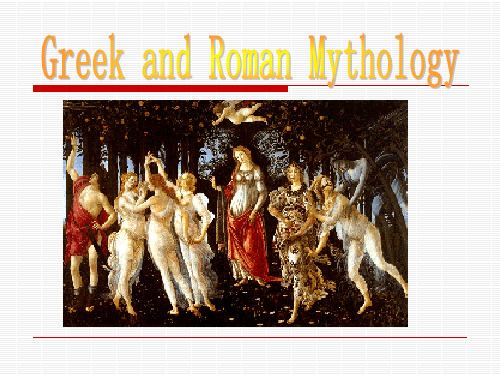
So, then we are going to have a quick look at the difference between the Roman Mythology and the Greek Mythology.
The First Difference
The origin of the two systems of Mythology: The archaic Romans did not have myths. Until their poets began to borrow from Greek models in the later part of the Republic, the Romans had no sequential narratives about their gods.
世俗气味。原为古意大利一女神的朱诺( Juno),同希腊女神赫拉合成一体,成为 朱庇特的妻子,秀丽端庄之外又平添里一 种峨眉善妒的品质。密涅瓦(Minerva) 原来既非智慧女神,又非朱庇特之女,然 而经过希腊工匠们的艺术加工后,这位意 大利工艺女神却变得同雅典娜相貌雷同起 来。 此外,天灾人祸,也使无所适从的 罗马人有神必求,有仙必拜。公元前五世 纪末一次大饥荒年间,罗马人求救于
(Ⅱ) In fact, the Mythology is an important document for the history and religion.
Significance
(Ⅲ) It also has great impact on other areas such as the science, technology, art (especially for the paintings and the sculptures), and the literature.
人教版高中英语选修11课件 Unit 4 Legends of ancient Greece 课件

The Iliad is mainly about a war between Ancient Greece and Troy, which lasted for 10 years. <<伊里亚特>>主要讲述了 一场发生在古希腊与特洛伊之间 长达10年的战争
The Odyssey is mainly about the 10-year adventure of Odysseus on his way home after the Trojan War and reassert his place as rightful king of Ithaca. <<奥德赛>>主要讲述了 奥德修斯在特洛伊战争之后 返家途中长达10年的冒险 经历并重新确立伊萨卡岛 国王的身份
6.Telemachus [ti'leməkəs] 忒勒马科斯 (Odysseus Penelope之子)
Pre-reading 1.Have you heard of Homer(荷马)?Can you name his masterpiece(代表作)? 2. Have you seen the film Troy <<木马屠城>>? Who is the hero that designed the Trojan Horse? 3. Look at the title of the reading passage and think about these two questions: Who went to search for Odysseus? Why?
☆ D.Telemachus will leave Circe and go on his
journey to seek news of Odysseus.
希腊神话 罗马神话PPT

Roman myths
Venus is the Roman god who is a symbol of love and beauty, also a symbol of fertility goddess.
Roman myths
Venus de Milo, it is believed to depict Venus, the goddess of love and beauty , It is a marble sculpture, slightly larger than life size at 203 cm high. Part of an arm were lost following its discovery.
Apollo was the god of music and poetry.He could stir up all feelings.These feelings are expressed in lofty songs.With his lyre of gold and the sweet accents of his godlike voice heled the choir of the Muses at Olympus.The pleasant music from his lyre was so exciting that stones marched into their places in rhythmic time and of their own will when he helped Poseidonbuild up the walls of Troy.
03
Interrelationships
The strength of Greek mythology lay in its collective nature . A myth always stood on its own , with a plot and a set of characters readily understood by those who listened to the storyteller or dramatist making use of it.
《希腊罗马神话》PPT课件

希腊罗马神话
神话的定义 英文中的神话<myth>一词来自希腊语中的
"mythos",其含意是"表达"、"言说"、"故事" 或"传说"等 . Mythology有两层意思,一个是指神话的总称或 神话集 ,神话故事通常不是分散、单个故事的 讲述,而往往是汇聚成体系,由若干有内在联系 的故事构成属于某特定民族的叙事,讲述其起 源、神祗、先祖和先祖崇拜的英雄人物,一般 涉及历史纪元开始之前"混沌之初"的时期.另 一层含意是神话学,指的是对神话叙事进行系 统收集和研究的学术领域 .
阿佛洛狄忒<Aphrodite>——美神与爱神 ;阿 瑞斯<Ares>——战神 ;赫菲斯托斯 <Hephaestus>——火神及工匠之神 ;赫尔墨 斯<Hermes>——诸神的传令使;德墨忒尔 <Demeter>——农耕和丰收女神 ;狄俄尼索 斯<Dionysus>——酒神.
希腊神话故事之一二
希腊神话中神的谱系
希腊神话包由神的故事和英雄传说两大类组成.
主神有: 宙斯<Zeus>——众神之君,掌管天上和人间 ; 赫拉<Hera>——天后,宙斯之妻,婚姻及妇女的保护神; 波塞冬<Poseidon>——海洋之神 ;哈得斯 <Hades>——冥王,主管冥间、地府;雅典娜 <Athena>——智慧女神 ;阿波罗<Apollo>——光明 之神;阿尔忒弥斯<Artemis>——狩猎与月亮女神;
在世界各神话体系当中 ,有产生于斯堪的纳维亚的北 欧神话和产生于中东的古代希伯莱神话 ,最广为人知 的就是古希腊神话、古罗马神话 .
lecture 4 古希腊罗马神话 英文版 教学课件
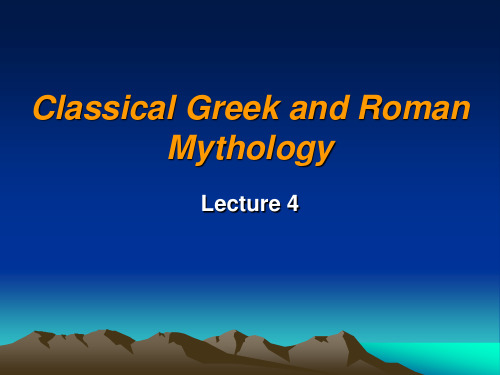
2. Cadmus and Europa
• Cadmus (卡德摩斯) was the son of Agenor, the King of Tyre (泰尔城国王阿哥诺耳), a city in Phoenicia (腓尼基城邦).
• He set out to find his sister Europa after she had been carried off by Zeus in the shape of a white bbes (底比斯)
• The cow led him to the site of Thebes. • When he sent his companions to fetch water
from a nearby spring, they were killed by a dragon that was guarding the source of water. • Cadmus killed the dragon and following the instruction of Athena, pulled out the dragon's teeth and sowed them in the ground. • At once, armed men sprang up and threatened to kill him. • By throwing a stone among them, Cadmus caused them to kill each other in the struggle to gain the stone. • At last five were left alive, who helped Cadmus build the city of Thebes and became the ancestors of the noble families of Thebes.
lecture 11-13 古希腊罗马神话 英文版 教学课件
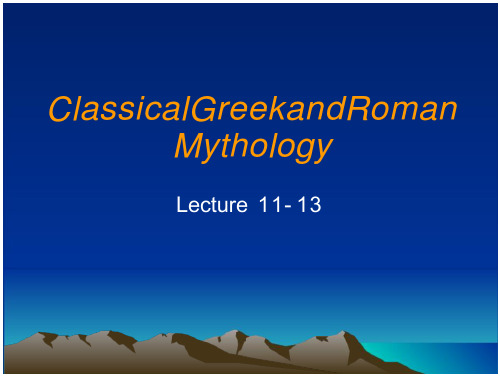
英语词Odyssey还指任何路途漫长 、充满风险的旅行 。
• Instead of leaving the place , they sat eating and drinking t i l l dawn . By then the Thracians had gathered and began to attack the men of Odysseus .
ClassicalGreekandRoman Mythology
Lecture 11- 13
Part IV : The Adventures of Odysseus
•11.. TThhee BBeeggiinnnniinngg VVooyyaaggee
•22.. TThhee LLoottuuss--EEaatteerrss
•The winds escaped from the bag and blew them back to the island of Aeolus aga in , who refused to provide any favourable winds .
5. Circe
•Circe was a beautiful goddess , who lived on an island in the Mediterranean Sea .
• lotus land : 常指梦幻般的地点或环境 , 俚语里指好莱坞
3. One-Eyed Giant
ture 古希腊罗马神话 英文版 教学课件

• However , luckily , soon after he was born , The ti dipped him in the River Styx in the Underworld .
• 1 . The Sacrifice of Iphigenenia • 2 . The Quarrel Between Achilles
and Agamemnon
• 3 . The Fight Between Achilles and Hector
• 4 . The Death of Achilles, and Ajax
3. Achilles
• Then they were told that Troy could not be taken without the a id of young Achilles , the seventh son of Peleus .
• Thetis , his mother had destroyed his other brothers by burning away their mortal parts , and he would have perished in the same way , had not Peleus snatched him from the fire .
• Return ing after n ine days , Agelaus was aston ished t o f i n d t h e child s t i l l a l i v e , and brought him home in a backpack (hence Par is " s name , which means "backpack " ) to rear as his own .
希腊神话 英语ppt完美~

Let’s introduce Apollo…
• Among the crowd of Olympian gods the one most widely admired was Apollo.He was the son of Zeus and Let to.According to Greek mythology,Leto was driven by Hera from land to land at last Poseidon took Pity on her and brought the island of Delos out of water for her to live on.There she gave birth to the twins , Apollo and Artemis. • Apollo was me sun-god.He wore a purple robe.He usually sat in his bright eastern palace early in the morning and made ready to start his daily journey across the sky.During the day he drove his carriage of gold and ivory , and brought light, life and love to the great world below. Later in the afternoon he came to the end of his journey in the far western sea and got on his golden boat to return to his eastern home. • Apollo was the god of music and poetry.He could stir up all feelings.These feelings are expressed in lofty songs . • Apollo stood for youthful and manly beauty.His golden hair, stately manner and air all combined to make him the admiration of the world.
- 1、下载文档前请自行甄别文档内容的完整性,平台不提供额外的编辑、内容补充、找答案等附加服务。
- 2、"仅部分预览"的文档,不可在线预览部分如存在完整性等问题,可反馈申请退款(可完整预览的文档不适用该条件!)。
- 3、如文档侵犯您的权益,请联系客服反馈,我们会尽快为您处理(人工客服工作时间:9:00-18:30)。
• One day, he found himself in the noble city of Delphi, and visited the temple of Apollo.
• According to one legend, Perseus, unwilling to take the kingdom of his grandfather, went to Asia, where his son Perses became the ruler of the Persians (波斯人), who were said to have been named after him.
• But Zeus fell in love with her, and turned himself into a shower of gold to fall on her.
• When Danae had a son, Acricius locked them in a chest and cast them into the sea.
Perseus fulfilled the oracle
• Perseus then returned to Seriphos just in time to save his mother from the violence of Polydectes, whom he turned to stone with the head of Medusa.
Classical Greek and Roman Mythology
Lecture 4
Part II The heroes in mythology
• 1. The story of Perseus
• 2. The story of Cadmus
• 3. The labors of Heracles
• The oracle advised him to give up his search and instead to do something more important.
• He was directed to follow a cow until she reached a place where she would lie down, and build city on the spot.
• Leaving Dictys as king, Perseus and his mother returned to Greece, where taking part in a game, Perseus accidentally killed his grandfather Acrisius with a discus, thus fulfilling the prediction of the oracle.
Cadmus built Thebes (底比斯)
• The cow led him to the site of Thebes. • When he sent his companions to fetch water
from a nearby spring, they were killed by a dragon that was guarding the source of water. • Cadmus killed the dragon and following the instruction of Athena, pulled out the dragon's teeth and sowed them in the ground. • At once, armed men sprang up and threatened to kill him. • By throwing a stone among them, Cadmus caused them to kill each other in the struggle to gain the stone. • At last five were left alive, who helped Cadmus build the city of Thebes and became the ancestors of the noble families of Thebes.
• An oracle said Andromeda should be sacrificed to the sea monster to save the land.
• But Perseus fell in love with the girl, killed the monster and married the beautiful princess.
• Armed with these, Perseus found Medusa and successfully cut off her head.
Perseus turned Atlas into mountains
• In due course he came in sight of the giant Atlas, to whom the gods had appointed the task of supporting the sky on his shoulders.
1. Perseus (珀耳修斯)
• Perseus, founder of Mycenae (迈锡尼), one of the most famous heroes in Greek Mythology, was the son of the god Zeus and the mortal Danae (达 那厄).
Perseus (珀耳修斯)
• However, they did not drown. Instead, blessed by Zeus, they drifted to the island of Seriphos (赛里福斯岛) and were rescued by Dictys, brother of King of Seriphos and Perseus grew up in his home. Later, Polydectes, the king, fell in love with Danae, but his love was not returned. Perseus was now a young man, and Polydectes, fearing that Perseus might interfere with his plan to marry Danae, sent him to fetch the head of Medusa (美杜莎), who was a snake-haired monster and whose head was so horrible that anyone who looked at it was turned to stone. In this way, Polydectes hoped that Perseus would be destroyed, but the gods favored the young man. Perseus: 英仙座
• Later he returned his magical loans to the gods and gave Medusa's head as a votive (献祭的) gift to Athena, who set it on Zeus' shield (which she carried), as the Gorgoneion (女魔脸形饰).
• Perseus had taken off his magic helmet, so Atlas saw him afar off, and was glad.
• "But oh, great Perseus, if ever you felt pity for grief, take pity on me now, who am condemned to support the sky for all eternity, unless you will bring an end to my sufferings! Show me the face of Medusa, and let me be changed into stone!"
• Perseus took their eye and tooth and refused to return them and forced them to tell him where to find Medusa.
• Then, Athena lent him a shield that had a smooth surface and could be used as a mirror so that he didn't have to look directly at Medusa; Hermes lent him wings for his shoes and a sword that could never be bent or broken; and Hades lent him a helmet (头 盔) that would make him invisible.
2. Cadmus and Europa
• Cadmus (卡德摩斯) was the son of Agenor, the King of Tyre (泰尔城国王阿哥诺耳), a city in Phoenicia (腓尼基城邦).
• He set out to find his sister Europa after she had been carried off by Zeus in the shape of a white bull.
